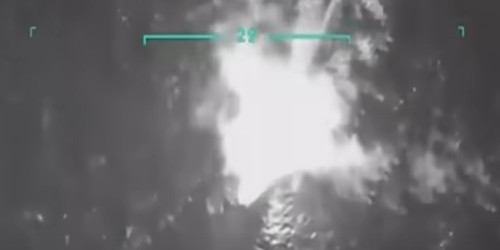
“A top Justice Department lawyer,” the Washington Post reports, “has told lawmakers that the Trump administration can continue its lethal strikes against alleged drug traffickers in Latin America — and is not bound by a decades-old law requiring Congress to give approval for ongoing hostilities.”
That law is the War Powers Resolution, which requires the president to inform Congress within 48 hours of commencing military hostilities, and to cease those operations within 60 days unless Congress authorizes their continuation.
The first admitted US military strike on a boat in the Caribbean occurred on September 4; under the War Powers Resolution those strikes (which have killed dozens) would necessarily end on November 4 unless Congress says “sure, keep on going.”
But it’s more complicated than that, and not just because White House Office of Legal Counsel chief T. Elliot Gaiser claims the War Powers Resolution only applies when US troops are “in harm’s way,” and that the drone strikes in question pose no such danger.
The big issue with the War Powers Resolution is that it’s unconstitutional. Not for the reason most administrations claim — that it limits an imagined presidential power to wage war at will and on whim — but in the other direction.
The US Constitution assigns the power to declare war exclusively to Congress. Not after the president has done whatever he wants for 60 days, but from the very beginning. Aside from immediate defense against direct attack, a president waging war prior to or outside of a congressional declaration is an impeachable “high crime.”
Some argue that the passage of time and advancement of technology imply a necessary expansion of presidential war powers: He must be able to act in the moment and not wait around on a dawdling Congress. It’s actually the other way around.
In 1941, it took 29 hours and 30 minutes from the first explosions at Pearl Harbor for Congress to declare war on Japan. That was before members of Congress could hop on planes to return to Washington — or, for that matter, boot up their laptops for Zoom meetings.
Since Congress has used remote and proxy technology before (during COVID), the infrastructure is already there for Congress to act quickly if its members believe a war is called for. Absent something on the level of a nuclear holocaust, the president could receive full war authority within single-digit hours.
But let’s take Gaiser at his word for a moment: If the drone strike campaign in the Caribbean isn’t war, what is it?
It’s not law enforcement. In law enforcement, there are investigations, charges filed, judicial warrants issued, and attempts at arrest. These drone strikes include none of those elements except, supposedly, investigations. They also take place entirely outside the legal jurisdiction of the United States.
Not war. Not law enforcement. What, then?
Murder. Murder most foul. Murder plain and simple.
Instead of whining at the administration to explain itself pursuant to legislation which illicitly assigns congressional war powers to the president in violation of the Constitution, Congress should impeach, remove, and forward criminal referrals to the Department of Justice concerning, the president, the secretary of defense, and military commanders who issued unlawful orders to commit dozens of murders as a distraction from the president’s domestic failures and political problems.
And then Congress should address one of those distractions by releasing the Epstein files.
Thomas L. Knapp (X: @thomaslknapp | Bluesky: @knappster.bsky.social | Mastodon: @knappster) is director and senior news analyst at the William Lloyd Garrison Center for Libertarian Advocacy Journalism (thegarrisoncenter.org). He lives and works in north central Florida.
PUBLICATION/CITATION HISTORY
